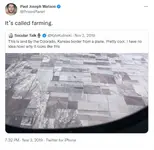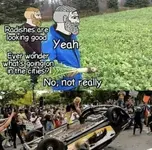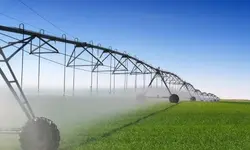For those who are farmers or interested in farming. For those with an interest in homesteading, see this thread.







I heard some guys on a plane one time just mystified by the round green areas you could see on the ground below. Of course they are produced by pivot irrigation systems. I was amazed that anyone could not know that. They were only about 20 years old though. It is even stranger that someone would not know what rectangular divisions in the land are for.
For their Daddies to build subdivisions on?
I wouldn't view this as a good thing. Those are almost guaranteed to be strong smelling fertilizer chemicals that you'd smell inside your car 100's of meters away & those fields are mostly lit up at night & it's a lot of light pollution. Most farmers in the world who operate on this scale are also burning during much of the year, making air for hundreds of miles around unbreathable & have lots of pollution from deforesting fields. I'd say if you see this to go the other way - you definately don't want to live around it.I heard some guys on a plane one time just mystified by the round green areas you could see on the ground below. Of course they are produced by pivot irrigation systems. I was amazed that anyone could not know that. They were only about 20 years old though. It is even stranger that someone would not know what rectangular divisions in the land are for.
View attachment 172
In some places in Texas there are seed swaps you can get from public libraries I am pretty sure.I wouldn't view this as a good thing. Those are almost guaranteed to be strong smelling fertilizer chemicals that you'd smell inside your car 100's of meters away & those fields are mostly lit up at night & it's a lot of light pollution. Most farmers in the world who operate on this scale are also burning during much of the year, making air for hundreds of miles around unbreathable & have lots of pollution from deforesting fields. I'd say if you see this to go the other way - you definately don't want to live around it.
I don't do any serious farming but I source food, even high quality beef locally & IMHO you need to be in areas with naturally fertile soil where local farmers exchange seeds amungst themselves & not buy from GMO type companies.
That guy provides very interesting info on small/family farming. For men considering a small farm, it seems like he's cracked the code for maximizing land use, rotating various herds across the same piece of land. It is labor intensive, compared to modern industrial farming, but if you have decent land and sufficient water, a relatively small farm could feed a family and make some income. Someone will still need a "town job" for insurance and some pay stability, though.How is the milk industry in the US set up, is there usually only one pasteurization facility that dairy farms have the option of selling to or is there competition for the milk? And can the farmers produce as much as they want or is there a quota like in some European countries?
I like the idea presented by Joel Salatin that consumers could sign a waiver to buy raw milk and meat from farms, but I don't see how the food needs of a country could be met without slaughterhouses and dairy processing facilities at scale. It does created the unfortunate circumstances that there is this centralized system that can be weaponized against the farmers, be it to monopolize or starve out the farmers in the shift away from meat and dairy to soy and bugs. But urban areas won't ever be fed without these middle men.
It would be interesting to learn how the food production system in Russia compares with the US seeing how they are both net exporters of food.
The thing that amazes me about this is that 1500 cattle a day will actually represent about 1.5% of US production, all from one plant! I am amazed that one plant in a small town in a cattle raising area could open and produce such a large percentage of the national total! I would expect there to be 1000 beef slaughter houses at least, or a least 100s, but if every plant were this size, there would only be 65. That makes it sound like many beef ranchers are a long way from the nearest facility.
The thing that amazes me about this is that 1500 cattle a day will actually represent about 1.5% of US production, all from one plant! I am amazed that one plant in a small town in a cattle raising area could open and produce such a large percentage of the national total! I would expect there to be 1000 beef slaughter houses at least, or a least 100s, but if every plant were this size, there would only be 65. That makes it sound like many beef ranchers are a long way from the nearest facility.
I wouldn't view this as a good thing. Those are almost guaranteed to be strong smelling fertilizer chemicals that you'd smell inside your car 100's of meters away & those fields are mostly lit up at night & it's a lot of light pollution. Most farmers in the world who operate on this scale are also burning during much of the year, making air for hundreds of miles around unbreathable & have lots of pollution from deforesting fields. I'd say if you see this to go the other way - you definately don't want to live around it.
I don't do any serious farming but I source food, even high quality beef locally & IMHO you need to be in areas with naturally fertile soil where local farmers exchange seeds amungst themselves & not buy from GMO type companies.
No. Farmers are made not born. But you don't need to be a "farmer," just a person who grows 50% of his own vegetables, herbs, meat, and fruit (which could sustain you 100% of the time if push came to shove).Are people born as farmers?
No. Farmers are made not born. But you don't need to be a "farmer," just a person who grows 50% of his own vegetables, herbs, meat, and fruit (which could sustain you 100% of the time if push came to shove).
It takes about 3 years/seasons to turn a brown thumb into a green thumb. Anyone with a decent IQ can learn to grow plants and animals and cook great food in a short amount of time... (if you can read you can learn animal husbandry, horticulture, and culinary arts).
The good news too is that, once you learn the yearly growth cycles, you can have 2 or 3 non-consecutive months "off" a year to pursue the other interests you mentioned (but you'll need to hire a part-time property caretaker to maintain basic pre-growth/harvest functions of your "system" during dormant weeks/months when you are traveling).
